Fleurs du Mal Magazine


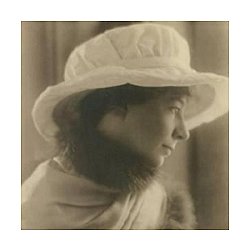
Sara Teasdale
(1884 – 1933)
In the Metropolitan Museum
Within the tiny Pantheon
We stood together silently,
Leaving the restless crowd awhile
As ships find shelter from the sea.
The ancient centuries came back
To cover us a moment’s space,
And thro’ the dome the light was glad
Because it shone upon your face.
Ah, not from Rome but farther still,
Beyond sun-smitten Salamis,
The moment took us, till you stooped
To find the present with a kiss.
Sara Teasdale poetry
fleursdumal.nl magazine
More in: Archive S-T, Teasdale, Sara
 The Sorrows of Young Werther (26) by J.W. von Goethe ♦ AUGUST 10. ♦ If I were not a fool, I could spend the happiest and most delightful life here. So many agreeable circumstances, and of a kind to ensure a worthy man’s happiness, are seldom united. Alas! I feel it too sensibly,–the heart alone makes our happiness! To be admitted into this most charming family, to be loved by the father as a son, by the children as a father, and by Charlotte! then the noble Albert, who never disturbs my happiness by any appearance of ill-humour, receiving me with the heartiest affection, and loving me, next to Charlotte, better than all the world! Wilhelm, you would be delighted to hear us in our rambles, and conversations about Charlotte. Nothing in the world can be more absurd than our connection, and yet the thought of it often moves me to tears.
The Sorrows of Young Werther (26) by J.W. von Goethe ♦ AUGUST 10. ♦ If I were not a fool, I could spend the happiest and most delightful life here. So many agreeable circumstances, and of a kind to ensure a worthy man’s happiness, are seldom united. Alas! I feel it too sensibly,–the heart alone makes our happiness! To be admitted into this most charming family, to be loved by the father as a son, by the children as a father, and by Charlotte! then the noble Albert, who never disturbs my happiness by any appearance of ill-humour, receiving me with the heartiest affection, and loving me, next to Charlotte, better than all the world! Wilhelm, you would be delighted to hear us in our rambles, and conversations about Charlotte. Nothing in the world can be more absurd than our connection, and yet the thought of it often moves me to tears.
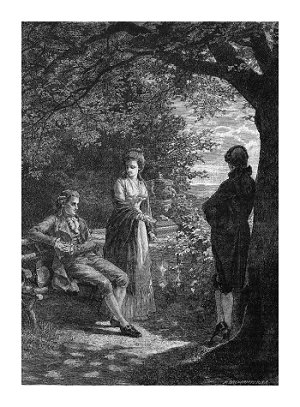 He tells me sometimes of her excellent mother; how, upon her death-bed, she had committed her house and children to Charlotte, and had given Charlotte herself in charge to him; how, since that time, a new spirit had taken possession of her; how, in care and anxiety for their welfare, she became a real mother to them; how every moment of her time was devoted to some labour of love in their behalf,–and yet her mirth and cheerfulness had never forsaken her. I walk by his side, pluck flowers by the way, arrange them carefully into a nosegay, then fling them into the first stream I pass, and watch them as they float gently away. I forget whether I told you that Albert is to remain here. He has received a government appointment, with a very good salary; and I understand he is in high favour at court. I have met few persons so punctual and methodical in business.
He tells me sometimes of her excellent mother; how, upon her death-bed, she had committed her house and children to Charlotte, and had given Charlotte herself in charge to him; how, since that time, a new spirit had taken possession of her; how, in care and anxiety for their welfare, she became a real mother to them; how every moment of her time was devoted to some labour of love in their behalf,–and yet her mirth and cheerfulness had never forsaken her. I walk by his side, pluck flowers by the way, arrange them carefully into a nosegay, then fling them into the first stream I pass, and watch them as they float gently away. I forget whether I told you that Albert is to remain here. He has received a government appointment, with a very good salary; and I understand he is in high favour at court. I have met few persons so punctual and methodical in business.
The Sorrows of Young Werther (Die Leiden des jungen Werther) by J.W. von Goethe. Translated by R.D. Boylan.
To be continued
fleursdumal.nl magazine for art & literature
More in: -Die Leiden des jungen Werther, Goethe, Johann Wolfgang von
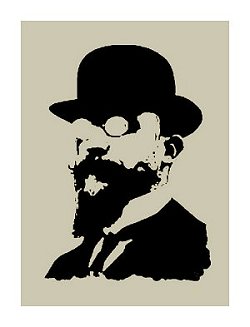
Erik Satie
(1866 – 1925)
Aubade
Ne dormez pas, belle endormie.
Écoutez la voix de votre bien-aimé.
Il pince un rigaudon.
Comme il vous aime !
C’est un poète.
L’entendez-vous ?
Il ricane, peut-être ?
Non : Il vous adore, douce Belle !
Il repince un rigaudon et un rhume.
Vous ne voulez l’aimer ?
Pourtant, c’est un poète, un vieux poète !
3 octobre 1915
Erik Satie Aubade
fleursdumal.nl magazine
More in: Archive S-T, MUSIC, Satie, Erik
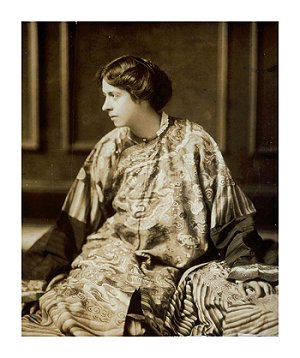
Eunice Tietjens
(1884 – 1944)
The Camels
Whence do you come, and whither make return, you
silent padding beasts?
Over the mountain passes; through the Great Wall; to
Kalgan–and beyond, whither?…
Here in the city you are alien, even as I am alien.
Your sidling jaw, your pendulous neck–incredible–and
that slow smile about your eyes and lip,
these are not of this land.
About you some far sense of mystery, some tawny
charm, hangs ever.
Silently, with the dignity of the desert, your caravans
move among the hurrying hordes, remote and
slowly smiling.
But whence are you, and whither do you make return?
Over the mountain passes; through the Great Wall; to
Kalgan–and beyond, whither?…
(Peking)
Eunice Tietjens poetry
fleursdumal.nl magazine
More in: Archive S-T, Tietjens, Eunice
 Ton van Reen: Katapult, de ondergang van Amsterdam (23)
Ton van Reen: Katapult, de ondergang van Amsterdam (23)
`Hoe heet ze?’
`Dat weet ik niet. Ze heeft ons haar naam niet genoemd.’
`Bij leven heette ik Jannie Jasmijn’, zei het vrouwtje.
`Verrek,’ zei Albert getroffen, `Jannie Jasmijn. Je was een beroemdheid toen ik nog jong was. Je moet toen al in je nadagen zijn geweest, maar je was een uitstekende zangeres.’
`Dat werd wel gezegd’, zei het vrouwtje grimmig.
`Ik heb mijn vader vaak over je horen vertellen’, zei Albert. `Hij had je zien optreden in de danstenten aan het Rembrandtplein. Ik wist niet dat je zo oud bent geworden. Ik weet niet anders dan dat je bent gestorven toen je nog beroemd was, want ik heb al jaren niets meer van je gehoord.’
`Je hebt gelijk’, zei het vrouwtje. `Een jaar of dertig geleden was ik nog bekend. Zo had ik de geschiedenis willen ingaan, dan had ik nu in elke encyclopedie gestaan. Ik heb mezelf overleefd.’
Crazy zette water op voor koffie. Het geruis van het gaspitje schiep een huiselijke sfeer in de kamer.
`Eigenlijk heette ik Heintje Steinbach’, zei het vrouwtje. `Maar mijn manager vond dat niet klinken. Jannie Jasmijn klonk veel meer Mokums.’
`Je zong toch ook in het Mokums’, zei Albert.
`Dat was een van mijn talenten’, zei het vrouwtje. `Ik kon zingen wat me voor de voeten kwam, elke taal, elk dialect.’
`Er waren ook heel wat onaardige verhalen over je in omloop’, zei Albert.
`Zeg het maar gerust’, zei het vrouwtje. `Ze zeiden dat ik een hoer was.’
`Zo erg was het nu ook weer niet.’
`Het was toch waar’, zei Jannie fel, en dat klonk heel raar, want welke vrouw zou toegeven dat ze een hoer was! `Ik gaf me af met de verkeerde mensen. Het is jammer dat ik dat pas later wist. Te laat, anders was ik misschien geëindigd als een nette mevrouw, achter gordijnen en bloempotten, want ik heb heel wat dure jongens aan de haak kunnen slaan.’
`Misschien was je dan zelf zo’n bloempot geworden’, zei Albert.
`Je hebt gelijk. Zo’n mevrouw, dat was voor mij niets geweest. Maar ja, als het te laat is, daarna pas ga je redeneren. Dan kun je de dingen niet meer doen die je achteraf eigenlijk graag had gedaan. Ik heb er vaak van gedroomd kinderen te hebben. In de jaren dat ik ze had kunnen krijgen, had ik er nooit tijd voor.’
Ze waren er stil van. Mireille huilde een beetje. Ze kon niet tegen dit soort gesprekken.
`Je hoeft er niet om te huilen kind’, zei het vrouwtje. `Zo draait het leven zijn rondjes. Pas achteraf weet je wat goed voor je zou zijn geweest.’
Het water kookte. Crazy zette koffie. Het viel hem nu pas op dat het vrouwtje sprak zonder dat haar mond bewoog. De stem kwam uit haar als uit een sprekende pop.
`Op de plaats waar nu de Disco staat,’ zei het vrouwtje, `daar stond vroeger mijn eigen cabaret. Daar ben ik jarenlang de trekpleister geweest. In de jaren twintig. Het gaat zo voorbij. Over een jaar of tien zal de Disco ook verdwenen zijn. Dan staat er weer een tent die past bij de volgende mode. God weet komt er weer een tijd dat ze de valeta dansen en dat jongens meisjes het hof maken.’ Daar moest ze zelf hard om lachen.
`Alles is mogelijk’, zei Crazy. `De geschiedenis herhaalt zich.’ Zijn stem klonk alsof hij het zelf niet geloofde.
Ton van Reen: Katapult (23)
wordt vervolgd
fleursdumal.nl magazine for art & literature
More in: - Katapult, de ondergang van Amsterdam, Reen, Ton van
 The Sorrows of Young Werther (25) by J.W. von Goethe ♦ AUGUST 8. ♦ Believe me, dear Wilhelm, I did not allude to you when I spoke so severely of those who advise resignation to inevitable fate. I did not think it possible for you to indulge such a sentiment. But in fact you are right. I only suggest one objection. In this world one is seldom reduced to make a selection between two alternatives. There are as many varieties of conduct and opinion as there are turns of feature between an aquiline nose and a flat one.
The Sorrows of Young Werther (25) by J.W. von Goethe ♦ AUGUST 8. ♦ Believe me, dear Wilhelm, I did not allude to you when I spoke so severely of those who advise resignation to inevitable fate. I did not think it possible for you to indulge such a sentiment. But in fact you are right. I only suggest one objection. In this world one is seldom reduced to make a selection between two alternatives. There are as many varieties of conduct and opinion as there are turns of feature between an aquiline nose and a flat one.
You will, therefore, permit me to concede your entire argument, and yet contrive means to escape your dilemma.
Your position is this, I hear you say: “Either you have hopes of obtaining Charlotte, or you have none. Well, in the first case, pursue your course, and press on to the fulfilment of your wishes. In the second, be a man, and shake off a miserable passion, which will enervate and destroy you.” My dear friend, this is well and easily said.
 But would you require a wretched being, whose life is slowly wasting under a lingering disease, to despatch himself at once by the stroke of a dagger? Does not the very disorder which consumes his strength deprive him of the courage to effect his deliverance?
But would you require a wretched being, whose life is slowly wasting under a lingering disease, to despatch himself at once by the stroke of a dagger? Does not the very disorder which consumes his strength deprive him of the courage to effect his deliverance?
You may answer me, if you please, with a similar analogy, “Who would not prefer the amputation of an arm to the periling of life by doubt and procrastination!” But I know not if I am right, and let us leave these comparisons.
Enough! There are moments, Wilhelm, when I could rise up and shake it all off, and when, if I only knew where to go, I could fly from this place.
♦ THE SAME EVENING ♦ My diary, which I have for some time neglected, came before me today; and I am amazed to see how deliberately I have entangled myself step by step. To have seen my position so clearly, and yet to have acted so like a child! Even still I behold the result plainly, and yet have no thought of acting with greater prudence.
The Sorrows of Young Werther (Die Leiden des jungen Werther) by J.W. von Goethe. Translated by R.D. Boylan.
To be continued
fleursdumal.nl magazine for art & literature
More in: -Die Leiden des jungen Werther, Goethe, Johann Wolfgang von
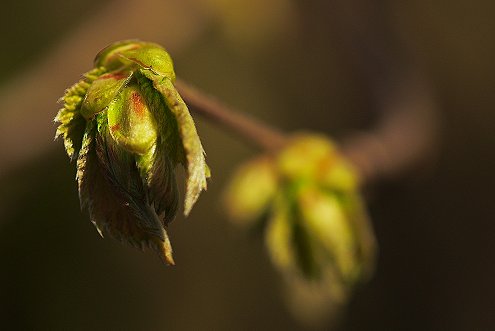
Hans Hermans photo: Lente (Spring)
hanshermans©2014
fleursdumal.nl magazine
More in: Dutch Landscapes, Hans Hermans Photos

Edward Thomas
(1878–1917)
Like the Touch of Rain
Like the touch of rain she was
On a man’s flesh and hair and eyes
When the joy of walking thus
Has taken him by surprise:
With the love of the storm he burns,
He sings, he laughs, well I know how,
But forgets when he returns
As I shall not forget her ‘Go now’.
Those two words shut a door
Between me and the blessed rain
That was never shut before
And will not open again.
Edward Thomas poetry
fleursdumal.nl magazine
More in: Archive S-T, Thomas, Edward
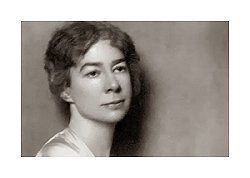
Sara Teasdale
(1884 – 1933)
There Will Come Soft Rains
There will come soft rains and the smell of the ground,
And swallows circling with their shimmering sound;
And frogs in the pools, singing at night,
And wild plum trees in tremulous white,
Robins will wear their feathery fire,
Whistling their whims on a low fence-wire;
And not one will know of the war, not one
Will care at last when it is done.
Not one would mind, neither bird nor tree,
If mankind perished utterly;
And Spring herself, when she woke at dawn,
Would scarcely know that we were gone.
Sara Teasdale poetry
fleursdumal.nl magazine
More in: Archive S-T, Teasdale, Sara
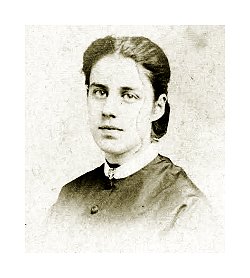
Emma Lazarus
(1849 – 1887)
HEROES
In rich Virginian woods,
The scarlet creeper reddens over graves,
Among the solemn trees enlooped with vines;
Heroic spirits haunt the solitudes,–
The noble souls of half a million braves,
Amid the murmurous pines.
Ah! who is left behind,
Earnest and eloquent, sincere and strong,
To consecrate their memories with words
Not all unmeet? with fitting dirge and song
To chant a requiem purer than the wind,
And sweeter than the birds?
Here, though all seems at peace,
The placid, measureless sky serenely fair,
The laughter of the breeze among the leaves,
The bars of sunlight slanting through the trees,
The reckless wild-flowers blooming everywhere,
The grasses’ delicate sheaves,–
Nathless each breeze that blows,
Each tree that trembles to its leafy head
With nervous life, revives within our mind,
Tender as flowers of May, the thoughts of those
Who lie beneath the living beauty, dead,–
Beneath the sunshine, blind.
For brave dead soldiers, these:
Blessings and tears of aching thankfulness,
Soft flowers for the graves in wreaths enwove,
The odorous lilac of dear memories,
The heroic blossoms of the wilderness,
And the rich rose of love.
But who has sung their praise,
Not less illustrious, who are living yet?
Armies of heroes, satisfied to pass
Calmly, serenely from the whole world’s gaze,
And cheerfully accept, without regret,
Their old life as it was,
With all its petty pain,
Its irritating littleness and care;
They who have scaled the mountain, with content
Sublime, descend to live upon the plain;
Steadfast as though they breathed the mountain-air
Still, wheresoe’er they went.
They who were brave to act,
And rich enough their action to forget;
Who, having filled their day with chivalry,
Withdraw and keep their simpleness intact,
And all unconscious add more lustre yet
Unto their victory.
On the broad Western plains
Their patriarchal life they live anew;
Hunters as mighty as the men of old,
Or harvesting the plenteous, yellow grains,
Gathering ripe vintage of dusk bunches blue,
Or working mines of gold;
Or toiling in the town,
Armed against hindrance, weariness, defeat,
With dauntless purpose not to serve or yield,
And calm, defiant, they struggle on,
As sturdy and as valiant in the street,
As in the camp and field.
And those condemned to live,
Maimed, helpless, lingering still through suffering years,
May they not envy now the restful sleep
Of the dear fellow-martyrs they survive?
Not o’er the dead, but over these, your tears,
O brothers, ye may weep!
New England fields I see,
The lovely, cultured landscape, waving grain,
Wide haughty rivers, and pale, English skies.
And lo! a farmer ploughing busily,
Who lifts a swart face, looks upon the plain,–
I see, in his frank eyes,
The hero’s soul appear.
Thus in the common fields and streets they stand;
The light that on the past and distant gleams,
They cast upon the present and the near,
With antique virtues from some mystic land,
Of knightly deeds and dreams.
Emma Lazarus poetry
fleursdumal.nl magazine
More in: Archive K-L, Lazarus, Emma
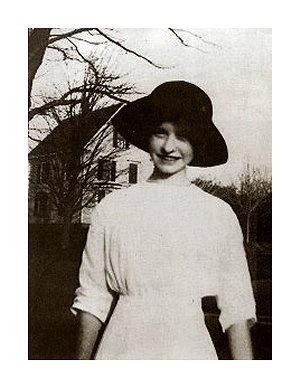
Eunice Tietjens
(1884 – 1944)
On the Canton River Boat
Up and down, up and down, paces the sentry.
He is dressed in a uniform of khaki and his socks are
green. Over his shoulder is slung a rifle, and
from his belt hang a pistol and cartridge pouch.
He is, I think, Malay and Chinese mixed.
Behind him the rocky islands, hazed in blue, the yellow
sun-drenched water, the tropic shore, pass as a
background in a dream.
He only is sweltering reality.
Yet he is here to guard against a nightmare, an
anachronism, something that I cannot grasp.
He is guarding me from pirates.
Piracy! The very name is fantastic in my ears, colored
like a toucan in the zoo.
And yet the ordinance is clear: “Four armed guards,
strong metal grills behind the bridge, the engine-room
enclosed–in case of piracy.”
The socks of the sentry are green.
Up and down, up and down he paces, between the
bridge and the first of the life-boats.
In my deck chair I grow restless.
Am I then so far removed from life, so wrapped in
cotton wool, so deep-sunk in the soft lap of civilization,
that I cannot feel the cold splash of truth?
It is a disquieting thought–for certainly piracy seems
as fantastic as ever.
The socks of the sentry annoy me. They are _too_
green for so hot a day.
And his shoes squeak.
I should feel much cooler if he wouldn’t pace so.
Piracy!
(Somewhere on the River)
Eunice Tietjens poetry
fleursdumal.nl magazine
More in: Archive S-T, Tietjens, Eunice
 Ton van Reen: Katapult, de ondergang van Amsterdam (22)
Ton van Reen: Katapult, de ondergang van Amsterdam (22)
`We zijn er’, hijgde Crazy, blij dat hij onderweg geen moeilijkheden had gehad met nieuwsgierige mensen of politie. `Hier is mijn paleisje op zolder.’
`Ik wil graag zien hoe je leeft’, zei het vrouwtje.
`Ik neem u mee naar boven,’ zei Crazy, `maar hoe krijg ik de kist de trap op?’
`Het kan ook zonder kist. Je kunt me dragen.’
Crazy trok de deur open aan het touwtje dat door de brievenbus hing. Voorzichtig haalde hij het vrouwtje uit de kist. Ze was zo stijf als een plank en kraakte verschrikkelijk, maar ze was zo licht als een vogeltje. Even huiverde hij toen hij de koude van het dode lijf door zijn kleren heen voelde, maar hij vermande zich en liep de trap op. Hij hoopte niemand van de andere bewoners van het huis te ontmoeten. Wat zouden die ervan denken als ze hem zouden tegenkomen met een dood vrouwtje? Ze wisten natuurlijk wel van hem dat hij vreemde lieden in huis haalde en hij had hun dat ook altijd tot op zeker hoogte kunnen verklaren, maar hoe zou hij hier woorden voor kunnen vinden?
`Hou je taai’, zei hij tegen het vrouwtje. `De trap is steil, maar ik ben van goede wil.’
`Je hoeft helemaal niet voorzichtig met me te doen’, zei ze bijna vrolijk. `Ik voel helemaal niets. Mijn lijf is alleen nog maar verpakking. Ik vind het fijn dat je me mee naar boven neemt, maar ik wil er niet te lang blijven. Het lijkt me niks om te liggen schimmelen in een bovenhuis.’
`Het heeft hier ook nooit naar bloemen geroken’, zei Crazy. Hij nam nu twee treden tegelijk, zoals zijn gewoonte was. Het vrouwtje leek ook steeds minder te wegen. Soms sloeg haar hoofd met een droge klap tegen de leuning. Ze leek er inderdaad niets van te voelen. Ze gaf geen kik.
Mireille zette het karretje achter de deur en volgde de twee naar boven, met de schoenen van het vrouwtje in de hand, aftrappers waar de armoede van afstraalde.
Het vogeltje, dat het vrouwtje tot in de kist had vergezeld, vloog met haar mee. Het kon blijkbaar geen moment zonder haar.
Toen ze de overloop bereikten, ging tot hun verbazing de deur van de kamer open.
`Vader!’ riep Mireille uit. Geschrokken liet ze de schoenen uit haar handen vallen. Ze vielen van de trap af naar beneden.
Ontdaan keek Albert naar het vreemde drietal. Hij deed een stap achteruit en wilde de deur dichtgooien.
`Ben maar niet bang’, zei Crazy. `Ze is dood.’
`Dood?’ zei Albert, met een stem die vreemd klonk. Hoewel hij als brandweerman toch heel wat was gewend, bleef het begrip in hem steken.
`We moeten plaats voor haar maken’, zei Crazy, die zag dat zijn kamer wel wat klein was voor hen allen.
`Doe voor mij geen moeite’, zei het vrouwtje. `Je kunt me onder de tafel leggen.’
Crazy legde haar op de mat. Het vogeltje streek neer op haar hoofd en bleef daar rustig zitten.
`Hoe komen jullie hier?’ vroeg Mireille.
`Het komt door David’, zei Albert. `Toen ik naar de kroeg was, heeft hij de pest in gekregen. Hij kon er niet tegen om alleen thuis te zijn.’
`Dat is mijn schuld’, zei Mireille geschrokken. `Ik had thuis moeten blijven. Ik laat hem vaak alleen.’
`Je zou ook mij een groot plezier doen als ik je eens thuis zou treffen’, zei Albert.
`Je hebt gelijk’, zei Mireille. `We zien elkaar nooit.’
`Hoe kom je nou aan dat vrouwtje?’ vroeg Albert, die nog steeds geen vat op de situatie had.
`Ik ben wel van haar geschrokken,’ zei Mireille, `maar ze is heel lief. Ze stond op straat, in de kist, en ze had ons nodig.’
Ton van Reen: Katapult (22)
wordt vervolgd
fleursdumal.nl magazine for art & literature
More in: - Katapult, de ondergang van Amsterdam, Reen, Ton van
Thank you for reading Fleurs du Mal - magazine for art & literature